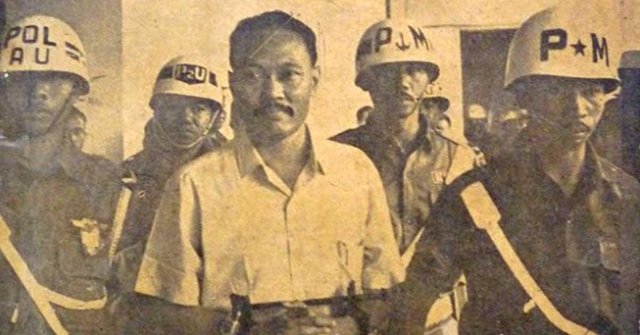Catch the General of the Fugitive

Brig. Gen. Soepardjo was brought to trial by the Supreme Military Tribunal (Mahmilub). Source: Repro book "Supardjo Direnggut Kalong" by M. Nurdin A.S. Source
Toward the end of Idul Fitri day, Commander of Kodam V Jaya Brigadier General Amirmachmud gets a special task. The order came directly from his superiors: Commander of Kostrad and concurrently the interim leader of Lt. Gen. Soeharto. Of course Amir undertakes.
"At that time he requested that I arrest Soepardjo on Eid day to be a gift of Lebaran for Indonesian Muslims," Amir recalls in his autobiography H. Amirmachmud: Warrior Warrior.
The fugitive was an officer of the rank of brigadier-general, the highest rank of a soldier directly involved in the September 30th Movement (G30S) 1965. With Lieutenant Colonel Oentoeng Sjamsoeri of the Tjakrabirawa Regiment, he was accused of designing the abduction of a number of high-ranking Army officers. Recorded since October 1965, Soepardjo has entered the list of Kodim 0501 Central Jakarta.
To arrest Soepardjo as soon as possible, Amir held an intelligence operation. A special team is formed in a "basket" encoded operation. So named because the operation team moves at night, like a bucket. Operation Kalong is led by Captain CPM Suroso. His personnel came from the Company Raiders Kodam V Jaya who was prepared as a combat troop. In addition, the reconnaissance group under the leadership of Lieutenant M. Afandi was in charge of finding Soepardjo's hiding information.
On January 10, 1967, as reported by Angkasa magazine vol.17, 1968, Soepardjo's hideout location is known to be in the KKO Complex of Cilincing, North Jakarta. One member of KKO AL, Major Adnan Suwardi accommodated Soepardjo in his residence. Team Operations Kalong rushed to Cilincing. But Soepardjo managed to escape to Halim Perdana Kusumah.
Soepardjo was dashed
In the morning before dawn on January 12, 1967, the Operation Team of Kalong moved towards Halim. Troops entered the AURI housing complex at 05.30. In the search, Soepardjo was captured in the attic of the Sutardjo Corporal Air House. Soepardjo was forced to step out of the attic after a capture force threatened to shoot him. In addition to Soepardjo also arrested Anwar Sanusi, a writer of history textbooks and members of the PKI.
The news of Soepardjo's disappearance came to Amir Machmud during the day. The news was reported Lieutenant Colonel Soedjiman when Amir finished his prayer at the Banteng field. How excited Amir was that he embraced and kissed Soedjiman many times. Both then sowan to Soeharto's house on Jalan Agus Salim reported "gift of Lebaran" is.
The end of Soepardjo's escape that led to the arrest was reported as a blessing. "Lebaran Gift for the People: Soepardjo, Anwar Sanusi successfully arrested. The 'Halim Fog' will be increasingly exposed, "Kompas wrote on January 16, 1967. In an accompanying editorial that same day, Kompas responded to Soepardjo's exact capture of Lebaran on symbolic day. On the day of Lebaran the fasting people celebrate his victory over the desires that were broken during a month of fasting.
"The capture of former Brigadier General Soepardjo is expected to break the G30S / PKI physical operation network that has been slipping everywhere. We believe the cleanup action will soon be done on all networks, "wrote Kompas.
Honest Officer
Is Soepardjo the villain as he is supposed to be? Two months after being captured, Soepardjo was confronted by the Extraordinary Military Tribunal (Mahmilub). The tribunal charged him with treason and sentenced him to death.
When both were imprisoned in the Budi Oetomo Military Prison (RTM), Oei Tjoe Tat, the Dwikora Cabinet minister revealed the other side of Soepardjo. Oei knew Soepardjo as Commander of the Combat Command in order to confront Malaysia in West Kalimantan. From the acknowledgment of his men, Soepardjo was a favored person, a military loyal to Bung Karno.
"General Pardjo as a prisoner in RTM gets sympathy from both the officers and the prisoners because of his attitude," Oei said in Memoir Oei Tjoe Tat: Assistant to President Soekarno.
According to Oei Tjoe Tat, Soepardjo figure of an honest and loyal officer. To Oei, Soepardjo once told about the existence of serious groups about confrontation and there are groups who just pretend for the sake of money. Oei seems to doubt the role of Soepardjo as the brains behind the G30S or at least he was plunged. "If it were true, he did not intend to revolt against Sukarno's government," Oei said.
In line with Oei, John Roosa historian of the University of British Columbia observes the peculiarities of Soepardjo's involvement in the G30S. Roosa relied on Soepardjo's document which was recorded on the run as "Some Opinions Affecting the Failure of the G-30s" Seen from a Military Corner ".
Soepardjo's document reveals that he is not the leader of the movement and also does not lead any troops in the G30S. As a military officer, Soepardjo wrote his confusion by all the deviations of the movement from military standard practice. "If he were responsible, one could hope that the movement would be a more professional operation," Roosa wrote in the Mass Killing Exam: the September 30 Movement and the Suharto Coup.
According to Roosa, Soepardjo is not one of the core leaders of G30S. His role was limited as an officer with connections to deal directly with President Sukarno. Soepardjo did not attend planning meetings in the preceding weeks. He arrived in Jakarta just three days before the action began.
"But regardless of the things that are very disappointing, he has written about the movement without any malice or resentment," Roosa wrote.
Daily Sinar Harapan October 3, 1968 proclaimed the decision of President Soeharto who rejected the request for pardon filed Soepardjo with four other G30S kingpin. One-star officer named Mustafa Sjarief Soepardjo was dying in the firing squad on May 16, 1970.
https://steemit.com/christianity/@bible.com/verse-of-the-day-revelation-21-8-niv